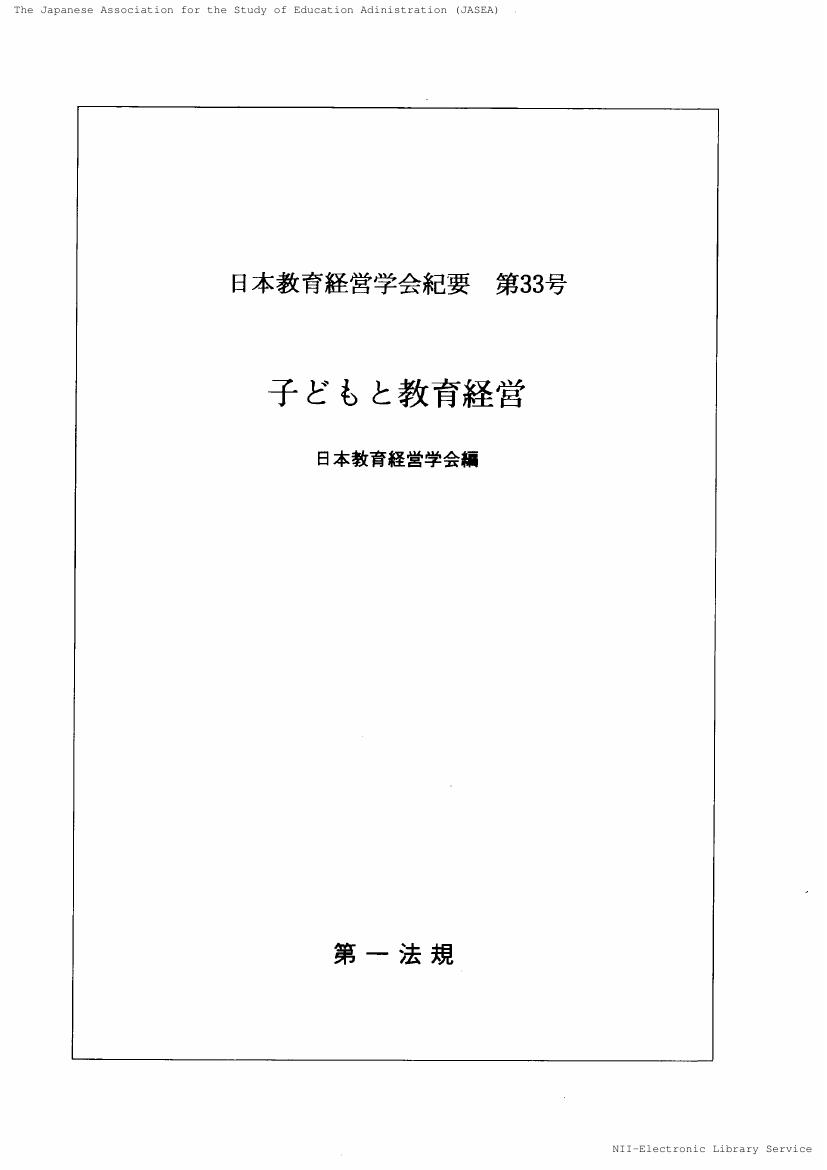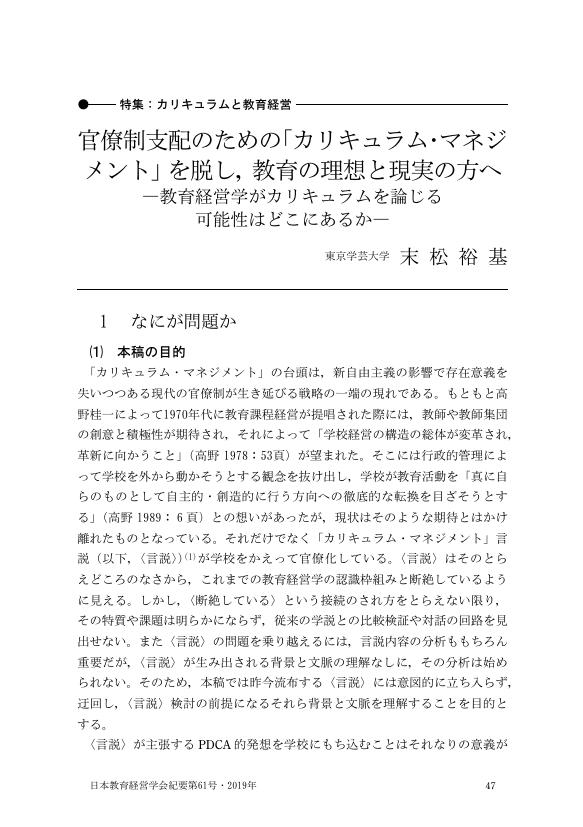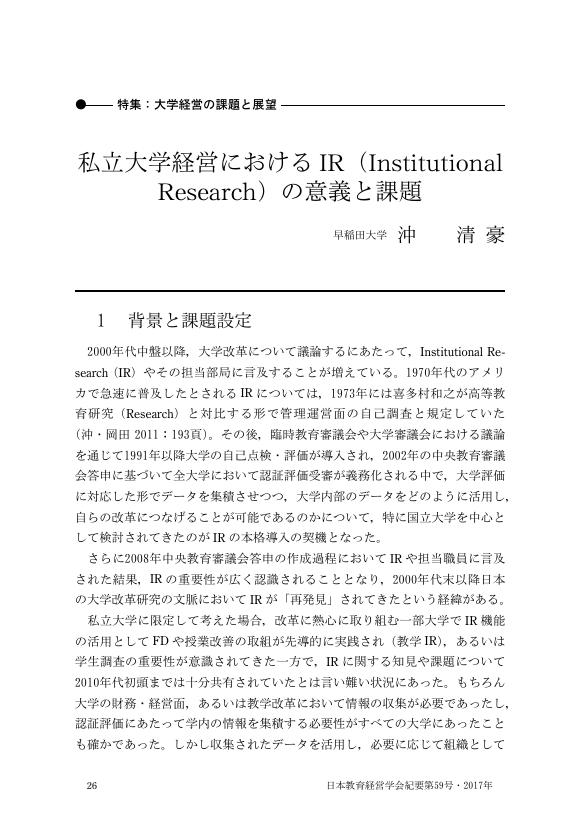1 0 0 0 OA 明治前期小学校設立過程にみる村落の共同体的自治 : 青森県・「学田制」の分析
- 著者
- 篠原 清昭
- 出版者
- 日本教育経営学会
- 雑誌
- 日本教育経営学会紀要 (ISSN:02872870)
- 巻号頁・発行日
- vol.25, pp.69-80, 1983 (Released:2017-07-06)
The main purpose of this thesis is to make the following points sufficiently clear: (1) what position village communities held, and (2) what role they played, in the construction and maintainance of village elementary schools in the beginning of the Meiji era. To attain this purpose studies have been made into the subject of the School Farm System introduced in Aomori Prefecture of those days. In conclusion, (1) village elementary schools were regarded as the common. property of the village community members and (2) the Meiji administrative power practiced usurpation upon village communities so as to establish modern educational system in their place.
1 0 0 0 OA 学校と家庭・地域の連携における子どもの位置(<特集1>教育経営と地域社会)
- 著者
- 岩永 定
- 出版者
- 日本教育経営学会
- 雑誌
- 日本教育経営学会紀要 (ISSN:02872870)
- 巻号頁・発行日
- vol.54, pp.13-22, 2012-05-30 (Released:2017-07-06)
The purpose of this paper is to examine the position of the child in the decision-making process of various programs. In this paper, I consider 1) treaty of the child right and attitude of Japanese government toward it, 2) theoretical development of participation of children, 3) policy document concerning to school, family, community partnership, 4) two cases that students worked on activities independently. An argument has been developed about the right of children, particularly the right to express own views and to participate to decision-making process since the right treaty of the child was approved in 1989. But, attitudes of Japanese government was negative, and educational laws and regulations did not changed. The opinion of the child is not still respected in many schools. In the developed country, many researchers discuss even the theoretical side about the participation of child. In Japan, such an argument is not at all considered. The policy documents about the school, family, community partnership program show the thought of the child contempt. I think the partnership policy is one step of progress, but these documents empathize the voice of parents and residents, but in policy, the child is existence as the object, not subject. The child only runs on the rail which an adult spread, and it is not permitted that the child spread a rail by oneself. What is the cause that brought such situation- I think that it is strong "paternalism" which stole into overall teachers, education researchers and adults. It is necessary to get rid of this "paternalism" as soon as possible. I introduced the example of two schools which overcame this spellbinding. It is not difficult. In many schools, there are a lot of students who are active in various activity. Without believing the power of the child, we cannot expect the growth of the child as independent human being.
- 著者
- 御代田 桜子
- 出版者
- 日本教育経営学会
- 雑誌
- 日本教育経営学会紀要 (ISSN:02872870)
- 巻号頁・発行日
- vol.61, pp.62-77, 2019-06-25 (Released:2020-09-12)
- 参考文献数
- 26
- 著者
- 木下 豪
- 出版者
- 日本教育経営学会
- 雑誌
- 日本教育経営学会紀要 (ISSN:02872870)
- 巻号頁・発行日
- vol.63, pp.70-86, 2021-06-30 (Released:2023-02-02)
- 参考文献数
- 16
1 0 0 0 OA 日本教育経営学会紀要 第33号(標題紙)
- 出版者
- 日本教育経営学会
- 雑誌
- 日本教育経営学会紀要 (ISSN:02872870)
- 巻号頁・発行日
- vol.33, pp.App1, 1991-06-01 (Released:2017-07-06)
1 0 0 0 OA 教員評価における目標管理の効果及びその影響要因に関する検討 : 学校段階間比較の視点から
- 著者
- 諏訪 英広
- 出版者
- 日本教育経営学会
- 雑誌
- 日本教育経営学会紀要 (ISSN:02872870)
- 巻号頁・発行日
- vol.57, pp.94-109, 2015-06-15 (Released:2017-07-06)
The purpose of this paper, on which was based on the perspective of the problem and challenges and overcoming those management by objectives, is to clarify the operational realities and effect and its impact factors of management by objectives in teacher evaluation. The following results were obtained: 1. While actual situation and the effect that captures the management by objectives as a means and opportunities of communication with its own look back and managers could be seen, teachers and the collective-cooperative life remained in individual pursuits of the management not yet up to reality and effects to capture. And, this trend was particularly strong in high school. 2. I found the following things about the impact factor for the effect recognition of management by objectives: 1) Each school stage, "advice and sharing and collaboration from managers and colleagues", "positive relationship with the principal" positive affected. In addition, it was not seen the impact of basic attributes, interviews, classroom observation. 2) In elementary school, "contemplation of the goal item" positive affected. 3) In junior high school, "integrally and growth atmosphere" positive affected. 4) In high school, "ingenuity of sharing and collaboration with colleagues in the management by objectives" positive affected. I make the following proposal for the effective operation method of management by objectives. 1. For teachers to understand the meaning of management by objectives and significance, images and specific method of approach, managers do compelling description through an appropriate scene and materials. 2. For management by objectives it becomes associated with the day-to-day practice is not formal, mandatory, managers achieve daily communication on which is based on the self-target faculty. 3. In particular, in the strong high school of individual business property, and to practice the ideas and initiatives that require the involvement of a colleague teachers, including the management.
1 0 0 0 OA 職員会議法制の変容と教職員の多忙化問題
- 著者
- 石井 拓児
- 出版者
- 日本教育経営学会
- 雑誌
- 日本教育経営学会紀要 (ISSN:02872870)
- 巻号頁・発行日
- vol.62, pp.2-16, 2020-07-30 (Released:2021-07-03)
- 参考文献数
- 32
1 0 0 0 OA 日本型学校教育における生徒指導の所在 ―生徒指導に対する認識・解釈の歴史的変遷より―
- 著者
- 棚野 勝文
- 出版者
- 日本教育経営学会
- 雑誌
- 日本教育経営学会紀要 (ISSN:02872870)
- 巻号頁・発行日
- vol.60, pp.180-185, 2018-06-25 (Released:2019-06-28)
1 0 0 0 OA 保護者の学校教育に対する意識と学校関与意欲の関係 : 小・中学校の保護者調査を通して
- 著者
- 岩永 定 芝山 明義 橋本 洋治 岩城 孝次
- 出版者
- 日本教育経営学会
- 雑誌
- 日本教育経営学会紀要 (ISSN:02872870)
- 巻号頁・発行日
- vol.46, pp.52-64, 2004-05-30 (Released:2017-07-06)
- 被引用文献数
- 1
In the recent educational reform, school, family, community partnership is emphasized in papers of various advisory committees. But many schools in Japan have closed the doors to parents and residents for a long time. It is easy to say that school should open, but difficult to realize it. At least, next three conditions are needed for partnership. They are 1) change of teachers' consciousness, 2) parents' active concern and participation, 3) support by community. Main purposes of this paper are to clarify the parents' evaluation to school that their child attend, composition of parents' consciousness to school education and the relation between these factors and parents' desire to participate to school. To perform these purposes, we practiced questionnaire survey. 3,322 responses of 12 elementary schools and 8 junior high schools, located at big city, urban area and local area, were analyzed. Research findings are as follows: 1) Although the parents' desire to participate to the school differs by the category, it is generally high. They want to get more informations about school activities, and to become friendly with teachers. But the parents do not want to participate in the organizational activities of a school. It means that parents are audiences, but not independent partners. 2) We were thinking to be able to catch the parents' consciousness with elements of 'independence', 'reliance' and 'secession'. As a result of factor analysis, next three factors were found, 'support for school' 'reliance to school' and 'aiming for a high academic career'. Our hypothesis was not proven. Items of question should be reconsidered. 3) These new factors affect the parents' desire of participation. The parents who support school actually, and aim for a high academic career for their children have high desire of participation. 4) Although the bad information of schools tends to be poured through mass media, many parents evaluate their children's school affirmatively. As the parents evaluate the school more affirmatively, the parents' desire of participation becomes higher except parents who rely to school excessively. As a result of survey, we can conclude that there is potential possibility for school, family, community partnership, but we must overcome many barriers to realize it inJapan.
- 著者
- 神林 寿幸
- 出版者
- 日本教育経営学会
- 雑誌
- 日本教育経営学会紀要 (ISSN:02872870)
- 巻号頁・発行日
- vol.62, pp.28-38, 2020-07-30 (Released:2021-07-03)
- 参考文献数
- 43
- 著者
- 末松 裕基
- 出版者
- 日本教育経営学会
- 雑誌
- 日本教育経営学会紀要 (ISSN:02872870)
- 巻号頁・発行日
- vol.61, pp.47-60, 2019-06-25 (Released:2020-09-12)
- 参考文献数
- 19
1 0 0 0 OA 少子化現象と学校教育の課題(<特集>教育人口の変動と教育経営の課題)
- 著者
- 小泉 祥一
- 出版者
- 日本教育経営学会
- 雑誌
- 日本教育経営学会紀要 (ISSN:02872870)
- 巻号頁・発行日
- vol.35, pp.17-25, 1993-06-01 (Released:2017-07-06)
- 著者
- 倉本 哲男
- 出版者
- 日本教育経営学会
- 雑誌
- 日本教育経営学会紀要 (ISSN:02872870)
- 巻号頁・発行日
- vol.45, pp.63-77, 2003-05-30 (Released:2017-07-06)
Most "Curriculum development" focuses on content & instruction levels of Curriculum, in USA. There has not been enough study of how to manage the curriculum system. Therefore, this study is focusing on the "curriculum management" Cycle theory by F. English. The author of "Curriculum Management Audit" with AASA (American Association of School Administration) & NCAC (National Curriculum Audit Center), F. English is well-known for his theories regarding curriculum management. First of all, the definition & nature of "Curriculum Management Audit" is discussed. Second of all, the total curriculum management concept integrates two areas which are: 1. how to develop curriculum contents & instruction and 2. how to operate curriculum systems. Typical practice is analyzed to observe this concept. To define the integrated concept, I have worked with Larry Fletch who is the coordinator of Cooperation for National Service. Finally, this study has implications for Japanese curriculum management study as well.
1 0 0 0 OA イギリスにおける地方当局会計監査委員会の設置と地方教育経営の改善
- 著者
- 藤田 弘之
- 出版者
- 日本教育経営学会
- 雑誌
- 日本教育経営学会紀要 (ISSN:02872870)
- 巻号頁・発行日
- vol.32, pp.52-66, 1990-06-01 (Released:2017-07-06)
The purpose of this paper is to explain and evaluate the activities of the Audit Commission for Local Authorities in England and Wales for improving the educational management and administration in local education authorities. So far, the district audit system checked the expenditures of the local authorities only from the point of illegality and regularity. But, in addition to this, the Audit Commission which was established by the Local Government Act 1982 began to examine the value for money, that is, efficiency, economy and effectiveness, in the provision of the services and the management and administration in the local authorities. And the activities of this Commission influenced and are influencing the educational management and administration in the local education authorities very much. Considering about this. I explained the following points in this paper: (1) Why and how was this Audit Commission established? (2) How was and is the Commission organized and what are the main activites to improve the management and administration in the local authorities? (3) What activities are being done to improve the educational management and administration in the local education authorities? (4) What influences are this Commission exerting on the local education authorities and what evaluations are being done by the people concerned?
1 0 0 0 OA 学校の自律性と子どもの自律性(<特集>教育経営の独立性を問う)
- 著者
- 藤井 穂高
- 出版者
- 日本教育経営学会
- 雑誌
- 日本教育経営学会紀要 (ISSN:02872870)
- 巻号頁・発行日
- vol.57, pp.14-23, 2015-06-15 (Released:2017-07-06)
In this paper, we try to explain the importance of school autonomy as the conditions of education for learner autonomy. We examine two research questions as the scaffolds. 1) How can we explain the relationship between teacher autonomy and school autonomy? 2) Can we explain teacher autonomy as the conditions for education of learner autonomy? 1) By examination of the theories on school management in Japan, we can say that the establishment of school autonomy is based on teacher autonomy. So teacher autonomy should be empowered and autonomy and collaboration of teachers are the key factor for school autonomy. But also in Japanese research context, theories of school autonomy don't discuss enough the contents of education for learner autonomy. 2) According to the education theories on the learning of children and teachers, we can point out "similarity" of learning between children and teachers. Also we can say that teachers' learning is the condition of learner autonomy as the archetype. In this sense, teacher autonomy is necessary conditions for learner autonomy. But at the same time, for the education of learner autonomy, teacher's role is also fostering learner autonomy by heteronomy. Finally we discuss the necessity of the integrated theory of learner autonomy and school autonomy which seems to be examined separately today.
1 0 0 0 OA アメリカにおけるスクールリーダーとその専門職団体について
- 著者
- 浜田 博文
- 出版者
- 日本教育経営学会
- 雑誌
- 日本教育経営学会紀要 (ISSN:02872870)
- 巻号頁・発行日
- vol.59, pp.139-143, 2017-06-25 (Released:2018-06-22)
- 著者
- 小野田 正利
- 出版者
- 日本教育経営学会
- 雑誌
- 日本教育経営学会紀要 (ISSN:02872870)
- 巻号頁・発行日
- vol.49, pp.156-160, 2007-05-30 (Released:2017-07-06)
At the end of 2006, the Fundamental Law of Education, which provides what the education in Japan for the period of post-war years should be, was amended. Now, the policy which relates to the reform of school education is placed as the most important issue of the policies in national and municipal governments. The Japanese citizen, national and municipal governments, and mass media etc. often criticize Japanese school education and its teachers, and insist that they change or be reformed. On the other hand, the school teachers who "are forged" or "bear" to reform, are in a severe condition on the point of human, material, and financial resources, so they cannot willingly get engaged in the reform. But, the people demanding that the school education and its teachers change or be reformed don't know or understand such conditions in school sites. In this year's study, the last year of a series of three year studies entitled as "School Sites Wavering in the Educational Reform", we discussed what prescriptions the educational administration researchers could present to the schools. The reporters are as follows. ・ From the side "swaying" the schools-Engaged in the planning stage of educational policies-(Ikuo KOMATSU : National Institute for Educational Research) ・ From the side "wavering (swayed)"(Masatoshi ONODA : Osaka University) ・ From the side "concerned" with the schools (2)(Toshitaka OKATOU: Hiroshima University) ・ From the side "concerned" with the schools (1) -Concerned with the school-sites as a consultant-(Shigeru AMAGASA: Chiba University)
- 著者
- 畑中 大路
- 出版者
- 日本教育経営学会
- 雑誌
- 日本教育経営学会紀要 (ISSN:02872870)
- 巻号頁・発行日
- vol.54, pp.76-91, 2012-05-30 (Released:2017-07-06)
School management research has recently emphasized the need to recognize the varied phases of the "dynamics of school management". This study investigates those dynamics through exploring the possibilities of Modified Grounded Theory Approach (M-GTA). M-GTA is one of the qualitative research methods derived from Grounded Theory Approach and has been widely used in the study of Nursing, Social Welfare, and so forth. To examine the possibilities of using M-GTA in school management research, this study focuses on how teachers in middle-level positions realize their ideas and negotiate with others through "middle-up-down management"; moreover, demonstrate the process of realizing teacher's ideas in terms of school improvement actions. In this paper, middle-ranking teachers' ideas are defined as initiatives for school improvement. In other words, the effectiveness of the "middle-up-down management" shows that the teachers in middle-level positions attempt to realize their ideas by utilizing their own position, as well as interaction among more senior and junior colleagues. Furthermore, this result reveals the interactional process in schools which consists of three phases "visualizing the status quo", "involvement", and "barriers against the ideas". The process constitutes the "dynamics of school management". Finally, the success of realizing ideas for improvement of schools often depends on the condition in schools and teachers' aspirations to lead the schools in pursuit of improvement. This study both contributes to our understanding of dynamics of school management, and demonstrates the usefulness of M-GTA in analysis of school management.
- 著者
- 屋敷 和佳
- 出版者
- 日本教育経営学会
- 雑誌
- 日本教育経営学会紀要 (ISSN:02872870)
- 巻号頁・発行日
- vol.53, pp.124-133, 2011-05-30 (Released:2017-07-06)
1 0 0 0 OA 私立大学経営におけるIR(Institutional Research)の意義と課題
- 著者
- 沖 清豪
- 出版者
- 日本教育経営学会
- 雑誌
- 日本教育経営学会紀要 (ISSN:02872870)
- 巻号頁・発行日
- vol.59, pp.26-35, 2017-06-25 (Released:2018-06-22)
- 参考文献数
- 13










